How To Eat Flax Seeds For Weight Loss – Recipes & Precautions
Teensy-weensy but nutrient-rich seeds that do wonders for weight reduction.
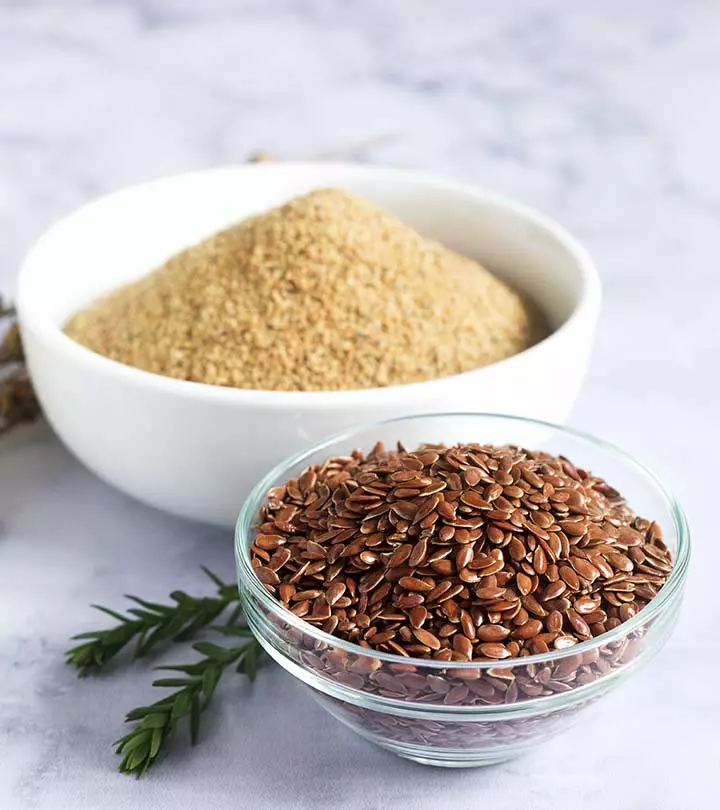
Image: ShutterStock
Using flaxseeds for weight loss can be effective in boosting your health. Flaxseeds are loaded with many beneficial nutrients that aid in metabolizing fat. These nutrients include fiber, omega 3 fatty acids, antioxidants, and protein. But you can reap all the benefits of this superfood only if you consume it the right way. Learn the perfect way to include these tiny seeds in your diet to aid your weight loss, their benefits, and the precautions you must take while consuming them. Scroll down!
In This Article
How Do Flax Seeds Aid Weight Loss?
Flaxseeds (Linum usitatissimum) are low in calories and packed with omega-3 fatty acids, ALA, proteins, dietary fiber, and antioxidants. They may aid weight loss by boosting metabolism, improving digestion, reducing inflammation, and increasing satiety.
1. Flax Seeds Are Rich In Omega-3 Fatty Acid
Flax seeds are rich in omega-3 fatty acids (1). Most diets are loaded with omega-6 fatty acids, which disrupts the normal omega-3 to omega-6 ratio (2). This leads to chronic inflammation in the body and consequent weight gain (3).
Consuming flax seeds helps balance the omega-3 to omega-6 ratio, thereby reducing chronic stress and the possibility of weight gain.
2. Dietary Fiber In Flax Seeds Increases Satiety
Dietary fiber is a type of carbohydrate that humans cannot digest or absorb (4). It is mainly found in whole grains, nuts, veggies, and fruits and is of two types – soluble and insoluble.
Flax seeds contain both soluble fiber (mucilage gums) and insoluble fiber (lignin and cellulose) (5). The soluble fiber forms a gel-like substance, which slows down the absorption of food in the digestive tract. This, in turn, makes you feel full for a long time. The insoluble fiber promotes the growth of good gut bacteria (6). The gut bacteria then ferment the soluble dietary fiber, producing short-chain fatty acids. These short-chain fatty acids, in turn, help improve metabolism (7).

Dietary fiber also adds bulk to the stool, which helps prevent constipation (8).
Flax seeds are rich in dietary fiber that may help lower cholesterol levels and increase fecal fat excretion. In one study, flax bread intake showed promising results compared with a control diet low in dietary fiber. Check out the graph below for the detailed results.
Mean Ratings Of Various Sensations During Days 2-7 With Different Diets
Source: Flaxseed dietary fibers lower cholesterol and increase fecal fat excretion, but magnitude of effect depend on food type3. Flax Seeds Are A Good Source Of Protein

Flaxseeds are rich in proteins, and 100 g of flaxseeds contains about 18.29 g of protein (9). Proteins help build lean muscle, which gives your body a slim and toned look (10), (11). Muscles also contain a higher number of mitochondria (cell organelles that help convert glucose to ATP), thereby giving your metabolism a serious boost (12).
4. Lignan In Flax Seeds Flush Out Toxins
Flaxseeds contain about 800 times more lignans than other plants. These phenolic compounds act as antioxidants that help scavenge free oxygen radicals (13). The free oxygen radicals are dangerous as they cause DNA damage, leading to chronic low-grade inflammation (14), (15), (16). This causes obesity, insulin resistance, and type 2 diabetes (17), (18).
A study published by Nutrition Journal confirmed that consuming 40 g flaxseed powder helps reduce inflammation and insulin resistance (19).
5. Flax Seeds Are Low In Calories
A tablespoon of ground flaxseeds contains only 55 Calories (9). You also get 18 grams of protein and loads of dietary fiber to keep you satiated for a longer duration. This way, you can easily create a calorie deficit, giving your body a chance to use the stored glycogen and fat.
These are the scientific reasons flaxseeds so good for weight loss. Now the question is, what is the best way to eat flaxseeds for weight loss? Let’s find out!
Key Takeaways
- The fiber content in flax seed gives a feeling of fullness and aids metabolism. Every tablespoon of flaxseed has 18 grams of proteins and fewer calories.
- Lignan in flax seed is an active antioxidant that detoxifies the body and fights obesity and inflammation.
- Add ground flaxseed to smoothies, salads, and soups to increase their nutritional value while also enjoying a nutty flavor.
- You can take 1-2 teaspoons of flaxseeds per day for losing weight.
How To Eat Flax Seeds For Weight Loss
For weight loss, flaxseed powder or ground flaxseeds work the best. Grinding flaxseeds helps separate the hull and the inner protein-rich seed part. The hull is usually rich in oils and dietary fiber. Both are good for human consumption (1). However, grinding it makes it easy to digest.
 Quick Tip
Quick TipYou may eat just the seed part or both the seeds and the husk to fine-tune your flaxseed intake to lose weight.
Incorporate flaxseeds in smoothies, yogurt, or oatmeal as part of your daily routine. This improves your breakfast’s nutritional profile in addition to its flavor. Another quick and healthy method for adding ground flaxseeds into your meals throughout the day is to sprinkle them over salads or include them in baked goods. Recently, flaxseed oil has also created a buzz in the market. Is flaxseed oil equally good for weight loss? Scroll down to find out.
Is Flax Seed Oil Helpful For Weight Loss?
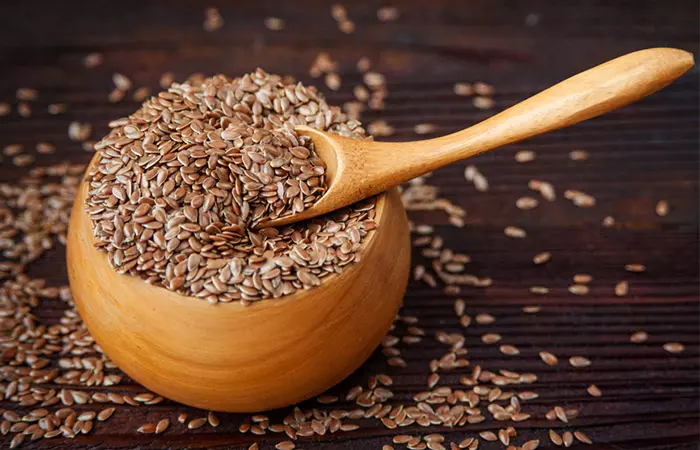
Yes, flaxseed oil is good for weight loss. Here’s why:
- Healthy Fat – Flaxseed oil (or linseed oil) is a reservoir of omega-3 fatty acids and alpha-linolenic acid (ALA) (20).
- Relieves Constipation – Flaxseed oil has laxative properties that can help you if you experience constipation regularly. It helps improve bowel movement, which helps support proper digestion (21).
- Reduces Inflammation – Flaxseed oil also helps reduce C-reactive proteinsi A protein made by the liver, a high level of which may cause inflammation and severe health conditions. that cause inflammation (22). This is good news for you as lower the inflammation, better the chances of losing weight.
Note
: Do not heat flaxseed oil for cooking purposes. You may use it as salad dressing and in dips and shakes.
Flaxseeds may aid weight loss. But what about other flaxseeds benefits? Let us take a look at the other health benefits of these seeds below.
Other Health Benefits Of Flaxseeds
- Lowers LDL Cholesterol: Omega-3 fatty acids and dietary fiber help improve heart health by reducing LDL or bad cholesterol (23).
- May Prevent Constipation: Dietary fiber adds bulk to the stool, which makes bowel movement easy (24).
- Boosts Immunity: The antioxidants present in flax seeds help boost your immunity, protect from microbial infections, and may decrease the risk of breast cancer (25), (26).
- Anti-inflammatory Property: Flax seeds contain omega-3 fatty acids that are anti-inflammatory (27).
- May Reduce Androgeni A group of male sex hormones that helps in the development of male sexual characteristics. Levels: Hormonal imbalance and poor lifestyle cause PCOS in women. Flax seeds may help reduce androgen levels and PCOS symptoms like hirsutismi A condition caused by excess male hormones in women leading to hair growth on the face, neck and chest (28).
- Acts As An Antidepressant: Flaxseeds may help improve mood and manage depression (29).
- Is Gluten-Free: Flax seeds are gluten-free. Hence, if you are gluten sensitive, you can use flax seeds as a substitute for gluten-containing foods, such as wheat, flour, etc.
- May Lower Blood Pressure: Flax seeds are rich in vitamin E and alpha-linolenic acid (ALA), which may reduce blood pressure levels. Vitamin E promotes sodium excretion in urine, reducing blood pressure levels (30). Additionally, flax seeds also contain phytoestrogens, which may reduce the risk of heart disease. Consuming flax seeds regularly may regulate blood pressure levels and improve overall heart health.
- Rich In Vitamin E: Flax seeds are rich in vitamin E, which is crucial for various bodily functions. It may help protect cells from oxidative stress, support the immune system, and promote skin health. It may also lower cholesterol levels, which may reduce the risk of heart disease (1) (31).
- May Support Heart Health: Flaxseeds may help lower blood pressure and improve cholesterol levels because of their high omega-3 fatty acid content, which promotes heart health (32).
Doro, a beauty vlogger, shared her experience of using a flax seed face mask and was amazed with the results. She said, “My skin is just smooth and soft. I feel like I have zero pores (ⅰ).”
Here are a few yummy and quick flax seed recipes.
Yummy Flax Seeds Recipes – Ways To Eat Flax Seeds
1. Banana Oats Flaxseed Smoothie
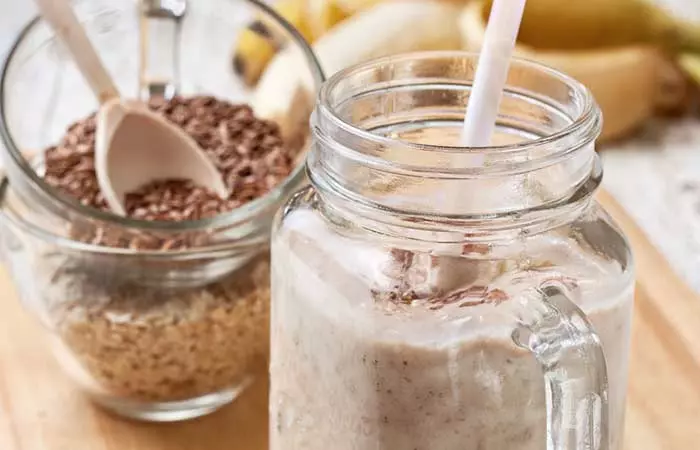
Prep Time: 7 minutes, Cooking Time: 1 minute, Serves: 1
Ingredients
- 1 banana
- 2 tablespoons instant oats, ground
- ½ apple
- 1 cup milk
- 1 date
- 1 tablespoon ground flaxseeds
How To Prepare
- Chop the banana, apple, and date and toss them into a blender.
- Add milk and ground oats to the blender and give it a spin.
- Pour the smoothie into a glass.
- Add one tablespoon of ground flaxseeds and stir well.
 Quick Tip
Quick Tip2. Spinach Tuna Flaxseeds Salad

Prep Time: 3 minutes, Cooking Time: 5 minutes, Serves: 1
Ingredients
- 1 cup baby spinach
- ½ cup smoked tuna
- 1 tablespoon milled flaxseeds
- ½ cup cherry tomatoes
- 1 tablespoon chopped garlic
- 4 tablespoons extra virgin olive oil
- Juice of half a lime
- 1 tablespoon Dijon mustard
- Salt to taste
- ½ teaspoon black pepper
How To Prepare
- Boil water in a high-rim saucepan. Add salt when the water starts boiling.
- Slice the cherry tomatoes into halves.
- Add the baby spinach and garlic. Cook for 2-3 minutes.
- Strain the spinach and garlic and add them to a bowl of ice-cold water.
- In the meanwhile, prepare the dressing by mixing extra virgin olive oil, lime juice, Dijon mustard, salt, and pepper in a bowl.
- Transfer the baby spinach from the cold water to a bowl.
- Toss in the cherry tomatoes and smoked tuna.
- Drizzle the dressing and mix well.
- Sprinkle flaxseed powder on top, and enjoy a delicious and nutty flavored salad for lunch.
3. Lentil Soup With Flaxseeds Dinner
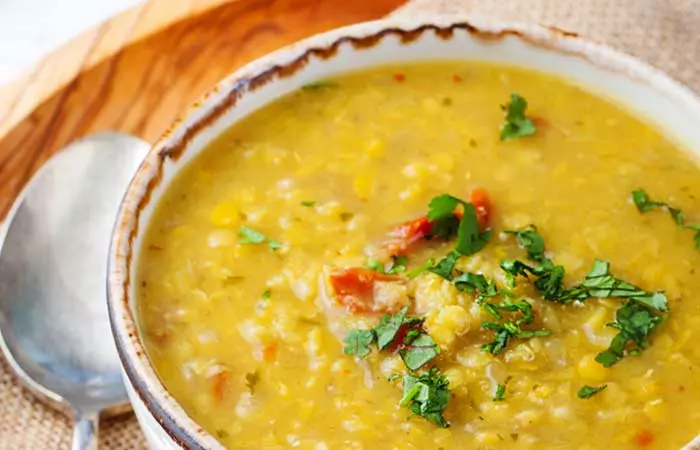
Prep Time: 10 minutes, Cooking Time: 10 minutes, Serves: 2
Ingredients
- ¼ cup yellow lentils
- 1 ½ teaspoons chopped garlic
- ¼ cup chopped tomato
- ¼ cup chopped onion
- 2 tablespoons flaxseed powder
- Salt to taste
- ¼ teaspoon black pepper
- 1 cup water
- 3 teaspoons extra virgin olive oil
- A handful of coriander leaves
How To Prepare
- Heat a soup pot and add extra virgin olive oil.
- After 30 seconds, add the chopped garlic and fry until it turns brown.
- Add the onions and cook for a minute.
- Add the chopped tomato, salt, and pepper. Mix well and cook for a minute.
- Add the lentils and mix well.
- Add a cup of water. Cook it with the lid on for about 10 minutes.
- Remove the soup pot from the flame and add flaxseed powder. Stir well.
- Garnish with a few coriander leaves.
 Quick Tip
Quick TipTake a look at the following precautions and tips for using flaxseeds for weight loss. These will help you keep any side effects of flaxseeds at bay.
Precautions And Tips
- Talk to your doctor before consuming flax seeds for weight loss.
- Avoid consuming flax seeds if you have an upset stomach.
- Avoid flax seeds if you have IBS (Irritable Bowel Syndrome) or IBD (Inflammatory Bowel Disease).
- Be careful if you are experiencing hormonal imbalances or endometriosisi A painful condition wherein the tissue lining inside the uterus (endometrium) grows outside the uterus. as flax seeds can mimic the action of estrogen.
- Do not consume flax seeds if you are pregnant or lactating.
- Avoid consuming them if you are on blood-thinning medication as flax seeds slow down blood clotting.
- Consume just 1-2 tablespoons of flax seeds per day. Do not overdose on flax seeds to lose weight quickly.
- Drink 3 liters of water per day. Drink 4-5 liters of water if you work out.
- Exercising is a must when it comes to losing weight. Work out at least 3-4 hours a week.
Infographic: Flaxseeds: Nutrition And How To Consume
Flaxseeds are highly nutritious and rich sources of essential macro and micronutrients. Hence, it’s no wonder they are becoming one of the most preferred functional foods. In the infographic below, we have delved into the nutritional profile of flaxseeds and how to consume them. Check it out!
Some thing wrong with infographic shortcode. please verify shortcode syntax
Consuming flaxseeds for weight loss is a good dietary approach to reduce fat and shed some pounds naturally. Their benefits emerge from the fact that they are low in calories and the best plant-based source of essential omega-3 fatty acids, fiber, protein, and antioxidants. This impressive profile helps increase metabolism, reduce energy intake by promoting satiety, and combat free radical damage and chronic inflammation, leading to effective weight loss. You can also include flaxseed oil in your diet as it contains healthy fats, helps lower blood sugar and bad cholesterol and reduces inflammation. However, consult your doctor before consuming flaxseeds as part of a weight loss diet and also watch its dosage.
Frequently Asked Questions
How much flaxseed to consume per day to lose weight?
Consume 1 tablespoon of flax seeds per day to lose weight. Pair it with healthy foods and a good workout routine.
Is flaxseed good for losing belly fat?
Yes, flax seeds are good for losing belly fat. It may not specifically target belly fat, but it aids overall weight loss, which also helps shed fat from the abdominal region.
Which is better for weight loss – chia seeds or flax seeds?
You may use both flax and chia seeds for weight loss. They are rich sources of protein, healthy fats, and dietary fiber. However, make sure you do not consume these in excess to prevent diarrhea.
What happens if you eat too much flaxseed?
Too much flaxseed in a day may cause stomach pain and diarrhea.
What is the best time to eat flax seeds for weight loss?
While you can have flax seeds at any time of the day, taking them early in the morning or before your meals may help you achieve better weight loss results. This is because it may promote digestion, and the fiber in the seeds may promote satiety.
What happens if we eat flax seeds on an empty stomach?
Flax seeds are fulfilling, and having them on an empty stomach may satiate your hunger.
Is it OK to eat chia seeds and flax seeds together?
Yes, both seed variants have a diverse range of nutrients complementing one another. You can add them to your shakes and salads or powder them into your dishes.
Should you soak flax seeds?
Soaking flax seeds is believed to boost their digestion and absorption of nutrients.
Illustration: How To Eat Flax Seeds For Weight Loss - Recipes & Precautions
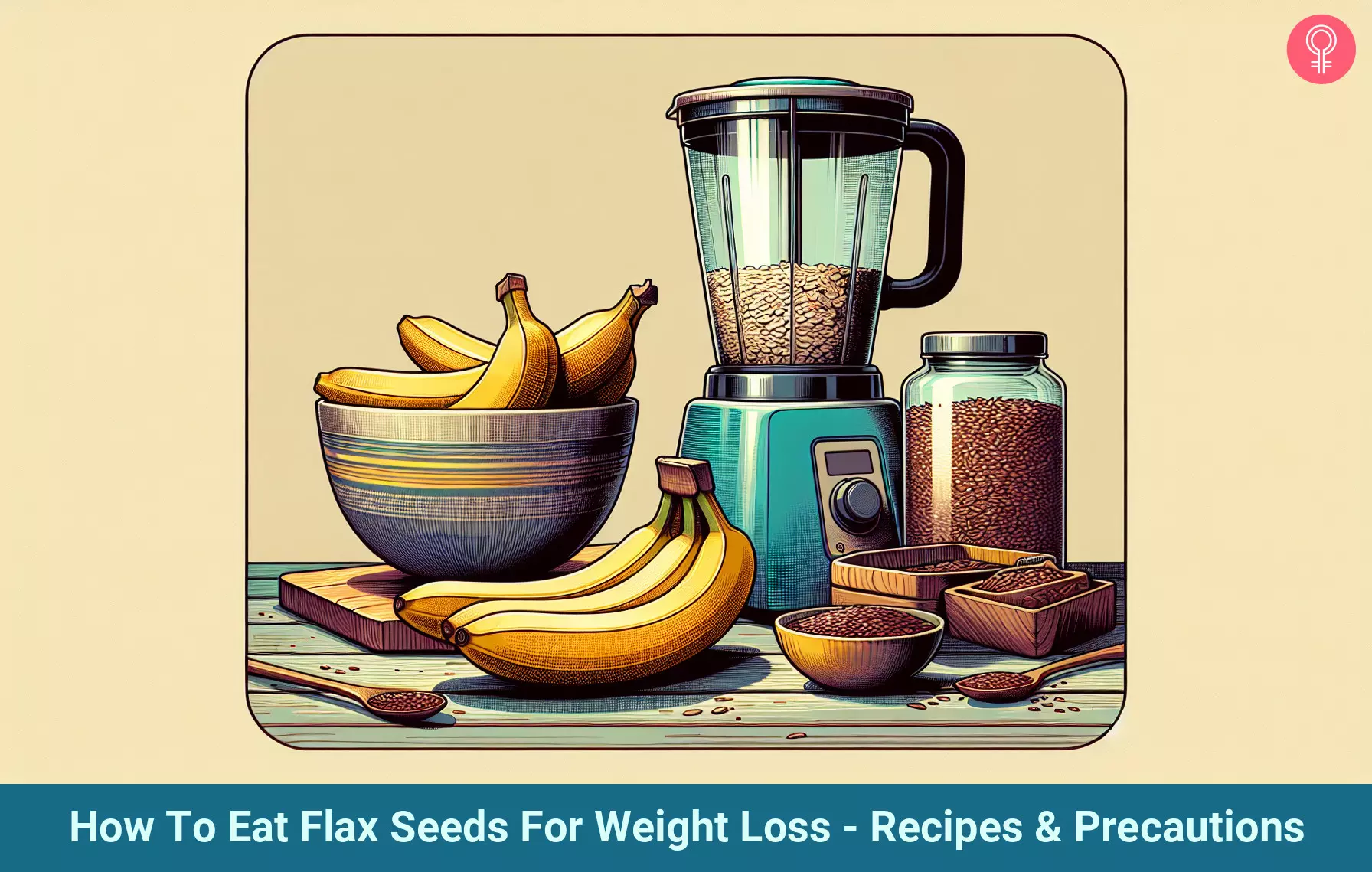
Image: Dall·E/StyleCraze Design Team
References
Articles on StyleCraze are backed by verified information from peer-reviewed and academic research papers, reputed organizations, research institutions, and medical associations to ensure accuracy and relevance. Read our editorial policy to learn more.
- Flaxseed—a potential functional food source, Journal of Food Science and Technology, US National Library of Medicine, National Institutes of Health.
https://www.ncbi.nlm.nih.gov/pmc/articles/PMC4375225/ - The importance of the ratio of omega-6/omega-3 essential fatty acids, Biomedicine & Pharmacotherapy, US National Library of Medicine, National Institutes of Health.
https://pubmed.ncbi.nlm.nih.gov/12442909/ - Importance of maintaining a low omega–6/omega–3 ratio for reducing inflammation, Open Heart, US National Library of Medicine, National Institutes of Health.
https://www.ncbi.nlm.nih.gov/pmc/articles/PMC6269634/ - Dietary fiber and prebiotics and the gastrointestinal microbiota, Gut Microbes, US National Library of Medicine, National Institutes of Health.
https://www.ncbi.nlm.nih.gov/pmc/articles/PMC5390821/ - Flax and flaxseed oil: an ancient medicine & modern functional food, Journal of Food Science and Technology, US National Library of Medicine, National Institutes of Health.
https://www.ncbi.nlm.nih.gov/pmc/articles/PMC4152533/ - Flaxseed Bioactive Compounds: Chemical Composition, Functional Properties, Food Applications and Health Benefits-Related Gut Microbes
https://www.researchgate.net/publication/364360375_Flaxseed_Bioactive_Compounds_Chemical_Composition_Functional_Properties_Food_Applications_and_Health_Benefits-Related_Gut_Microbes - The role of short-chain fatty acids in the interplay between diet, gut microbiota, and host energy metabolism, Journal of Lipid Research.
https://www.jlr.org/content/54/9/2325.short - Dietary fibre in foods: a review, Journal of Food Science and Technology, US National Library of Medicine, National Institutes of Health.
https://www.ncbi.nlm.nih.gov/pmc/articles/PMC3614039/ - Seeds, flaxseed, FoodData Central, United States Department of Agriculture.
https://fdc.nal.usda.gov/fdc-app.html#/food-details/169414/nutrients - Dietary protein for athletes: from requirements to optimum adaptation, Journal of Sports Sciences, US National Library of Medicine, National Institutes of Health.
https://pubmed.ncbi.nlm.nih.gov/22150425/ - Protein Intake, Especially Vegetable Protein Intake, Is Associated with Higher Skeletal Muscle Mass in Elderly Patients with Type 2 Diabetes, Journal of Diabetes Research, Hindawi.
https://www.hindawi.com/journals/jdr/2017/7985728/ - Chapter 2 – Anatomy of Skeletal Muscle and Its Vascular Supply, Skeletal Muscle Circulation, US National Library of Medicine, National Institutes of Health.
linkhttps://www.ncbi.nlm.nih.gov/books/NBK57140/ /a> - Flax and flaxseed oil: an ancient medicine & modern functional food, Journal of Food Science and Technology, US National Library of Medicine, National Institutes of Health.
https://www.ncbi.nlm.nih.gov/pmc/articles/PMC4152533/ - Oxygen free radicals and the systemic inflammatory response, IUBMB Life, US National Library of Medicine, National Institutes of Health.
https://pubmed.ncbi.nlm.nih.gov/15230345/ - Free radical-induced damage to DNA: mechanisms and measurement, Free Radical Biology & Medicine, US National Library of Medicine, National Institutes of Health.
https://pubmed.ncbi.nlm.nih.gov/12031895/ - Does the Interdependence between Oxidative Stress and Inflammation Explain the Antioxidant Paradox? Oxidative Medicine and Cellular Longevity, US National Library of Medicine, National Institutes of Health.
https://www.ncbi.nlm.nih.gov/pmc/articles/PMC4736408/ - Chronic Inflammation in Obesity and the Metabolic Syndrome, Mediators of Inflammation, US National Library of Medicine, National Institutes of Health.
https://www.ncbi.nlm.nih.gov/pmc/articles/PMC2913796/ - Obesity-associated low-grade inflammation in type 2 diabetes mellitus: causes and consequences, The Netherlands Journal of Medicine, US National Library of Medicine, National Institutes of Health.
https://pubmed.ncbi.nlm.nih.gov/23723111/ - Flaxseed supplementation improved insulin resistance in obese glucose intolerant people: a randomized crossover design, Nutrition Journal, US National Library of Medicine, National Institutes of Health.
https://www.ncbi.nlm.nih.gov/pmc/articles/PMC3112403/ - The cardiovascular effects of flaxseed and its omega-3 fatty acid, alpha-linolenic acid, The Canadian Journal of Cardiology, US National Library of Medicine, National Institutes of Health.
https://www.ncbi.nlm.nih.gov/pmc/articles/PMC2989356/ - The short-term effects of olive oil and flaxseed oil for the treatment of constipation in hemodialysis patients, Journal of Renal Nutrition, US National Library of Medicine, National Institutes of Health.
https://pubmed.ncbi.nlm.nih.gov/25238699/ - Flaxseed oil supplementation decreases C-reactive protein levels in chronic hemodialysis patients, Nutrition Research, US National Library of Medicine, National Institutes of Health.
https://pubmed.ncbi.nlm.nih.gov/23244537/ - Flaxseed reduces total and LDL cholesterol concentrations in Native American postmenopausal women, Journal of Women’s Health, US National Library of Medicine, National Institutes of Health.
https://pubmed.ncbi.nlm.nih.gov/18328014/ - A randomized trial of the effects of flaxseed to manage constipation, weight, glycemia, and lipids in constipated patients with type 2 diabetes, Nutrition & Metabolism, US National Library of Medicine, National Institutes of Health.
https://www.ncbi.nlm.nih.gov/pmc/articles/PMC5944250/ - Antioxidant capacity of flaxseed products: the effect of in vitro digestion, Plant Foods for Human Nutrition, US National Library of Medicine, National Institutes of Health.
https://pubmed.ncbi.nlm.nih.gov/23224443/ - The Effect of Flaxseed in Breast Cancer: A Literature Review, Frontiers in Nutrition, US National Library of Medicine, National Institutes of Health.
https://www.ncbi.nlm.nih.gov/pmc/articles/PMC5808339/ - Dietary omega-3 fatty acids aid in the modulation of inflammation and metabolic health, California Agriculture, US National Library of Medicine, National Institutes of Health.
https://www.ncbi.nlm.nih.gov/pmc/articles/PMC4030645/ - The Effect of Flaxseed Supplementation on Hormonal Levels Associated with Polycystic Ovarian Syndrome: A Case Study, Current Topics in Nutraceutical Research, US National Library of Medicine, National Institutes of Health.
https://www.ncbi.nlm.nih.gov/pmc/articles/PMC2752973/ - Antidepressant-Like Effect of Selected Egyptian Cultivars of Flaxseed Oil on a Rodent Model of Postpartum Depression, Evidence-based Complementary And Alternative Medicine, US National Library of Medicine, National Institutes of Health.
https://www.ncbi.nlm.nih.gov/pmc/articles/PMC5733178/ - Relationship of Dietary Linoleic Acid to Blood Pressure, AHA Journals.
https://www.ahajournals.org/doi/full/10.1161/HYPERTENSIONAHA.108.112383 - The Role of Vitamin E in Human Health and Some Diseases, Sultan Qaboos University Medical Journal, US National Library of Medicine, National Institutes of Health.
https://www.ncbi.nlm.nih.gov/pmc/articles/PMC3997530/ - Flaxseed: its bioactive components and their cardiovascular benefits
https://pubmed.ncbi.nlm.nih.gov/29101172/
Read full bio of Jess Wharton
Read full bio of Ravi Teja Tadimalla
Read full bio of Payal Karnik








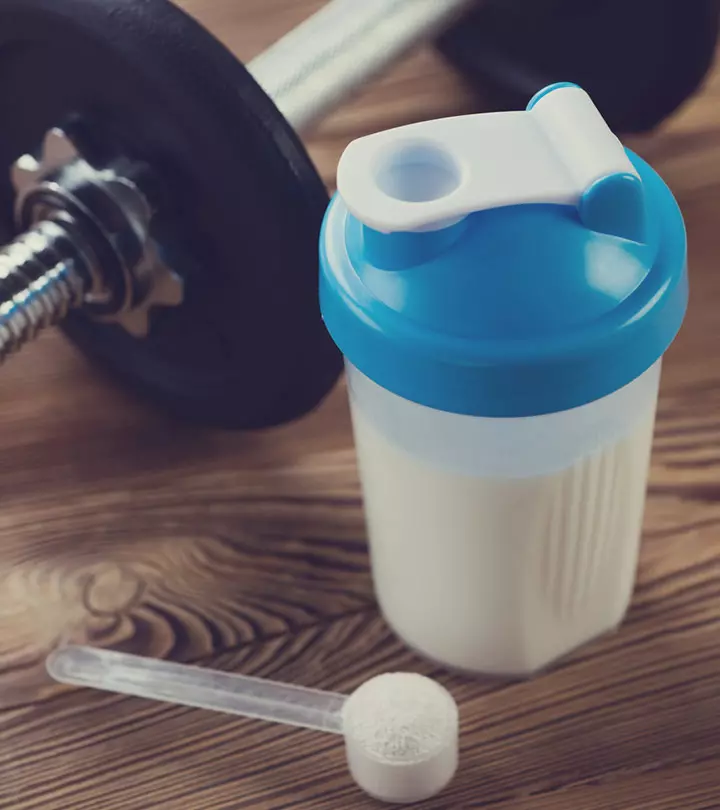
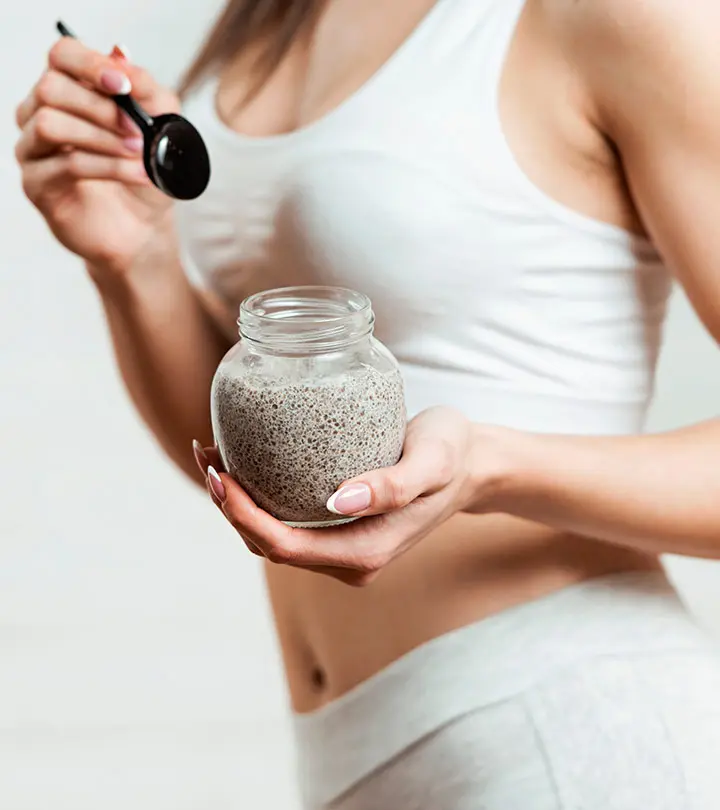
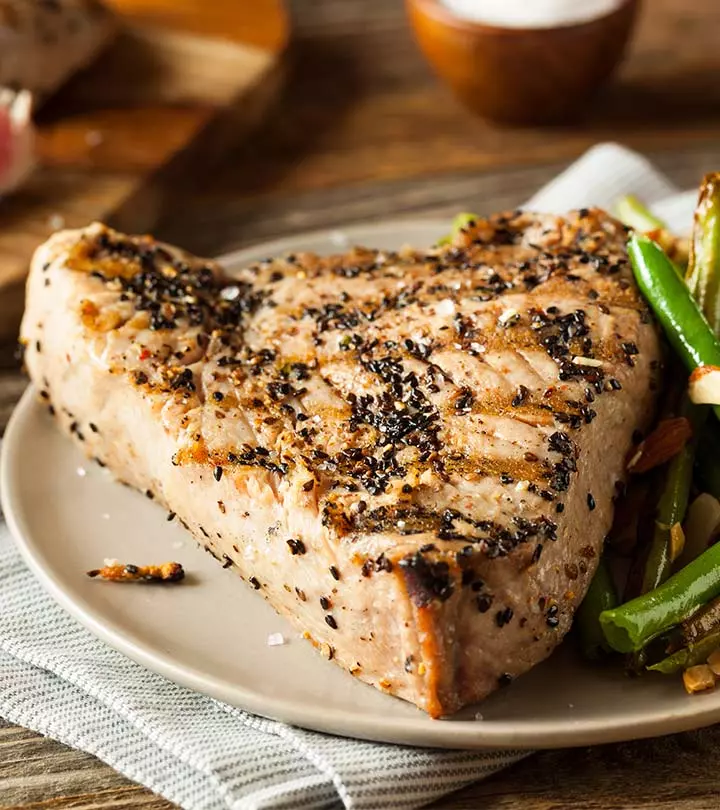
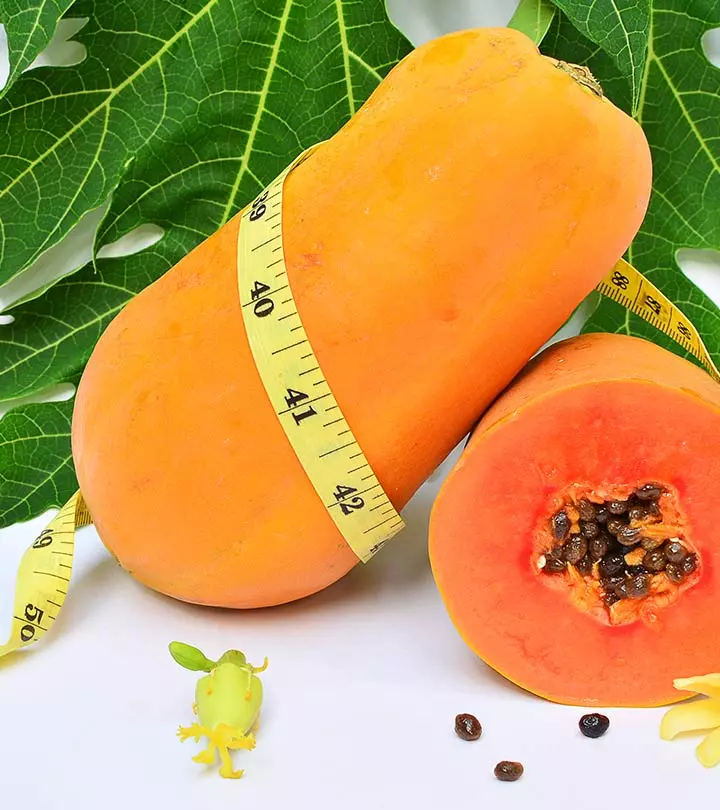
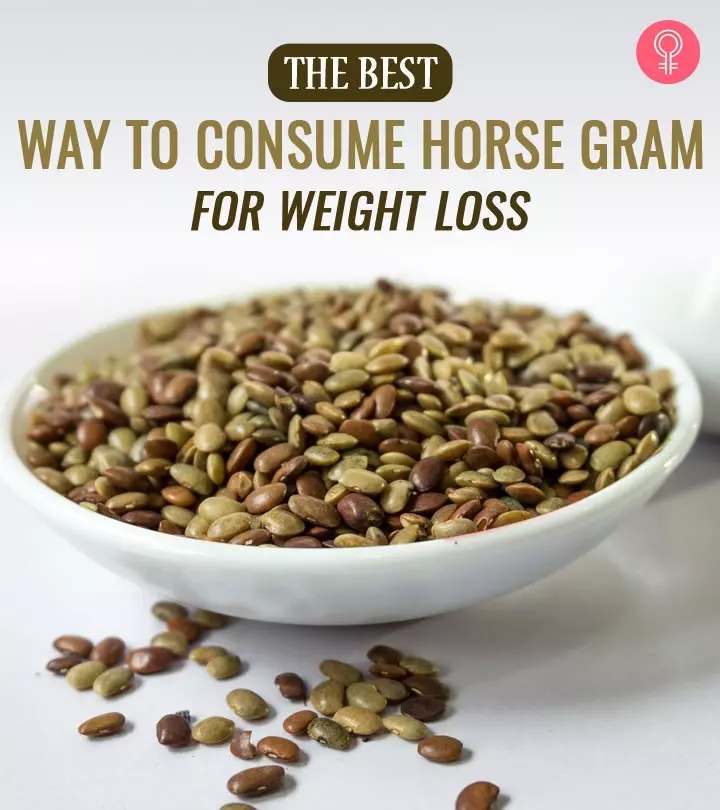
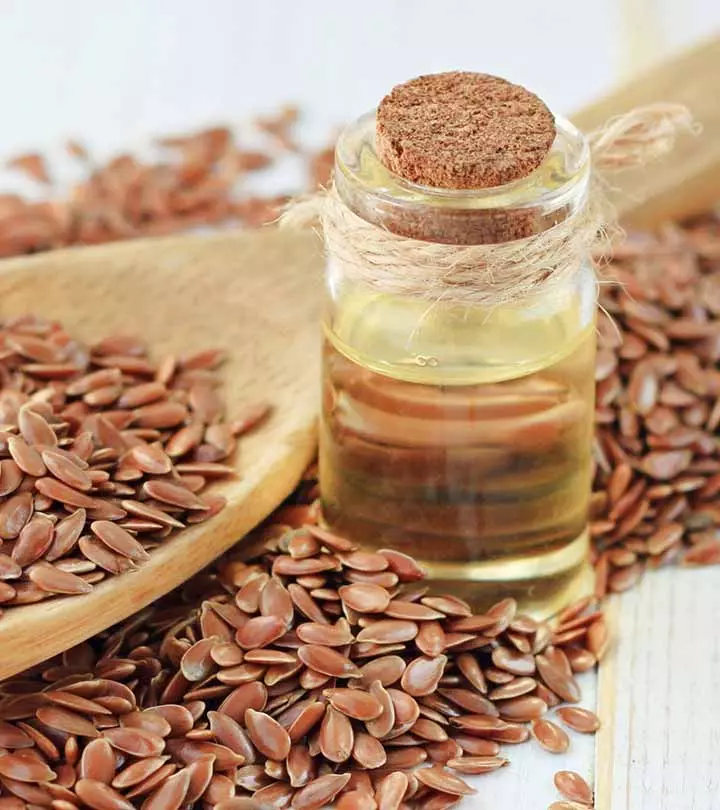
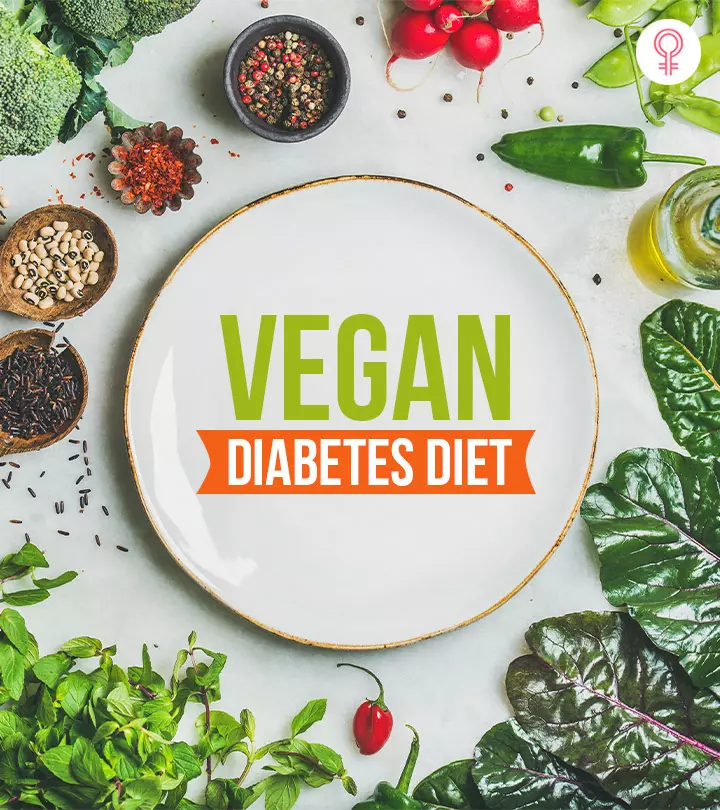
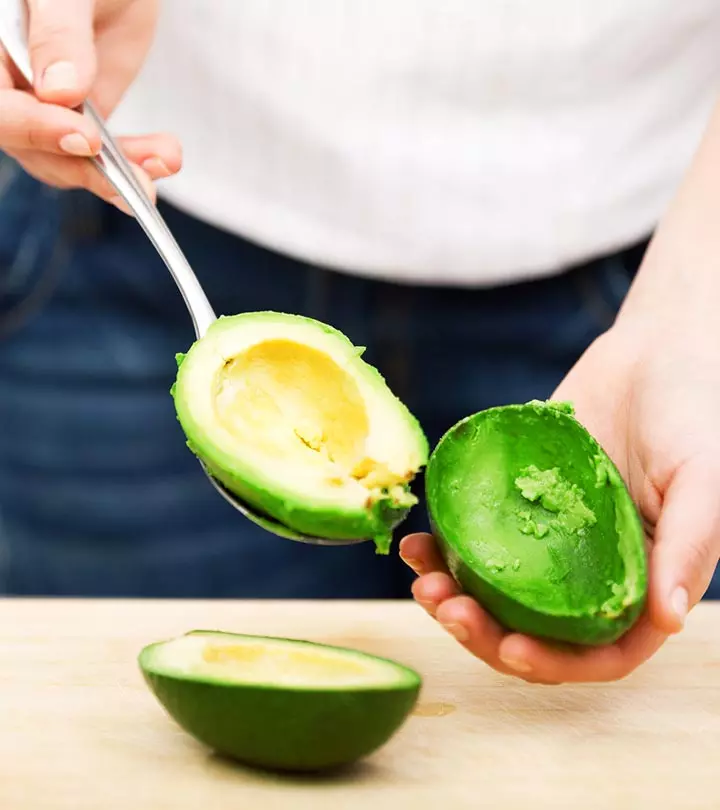










Community Experiences
Join the conversation and become a part of our empowering community! Share your stories, experiences, and insights to connect with other beauty, lifestyle, and health enthusiasts.